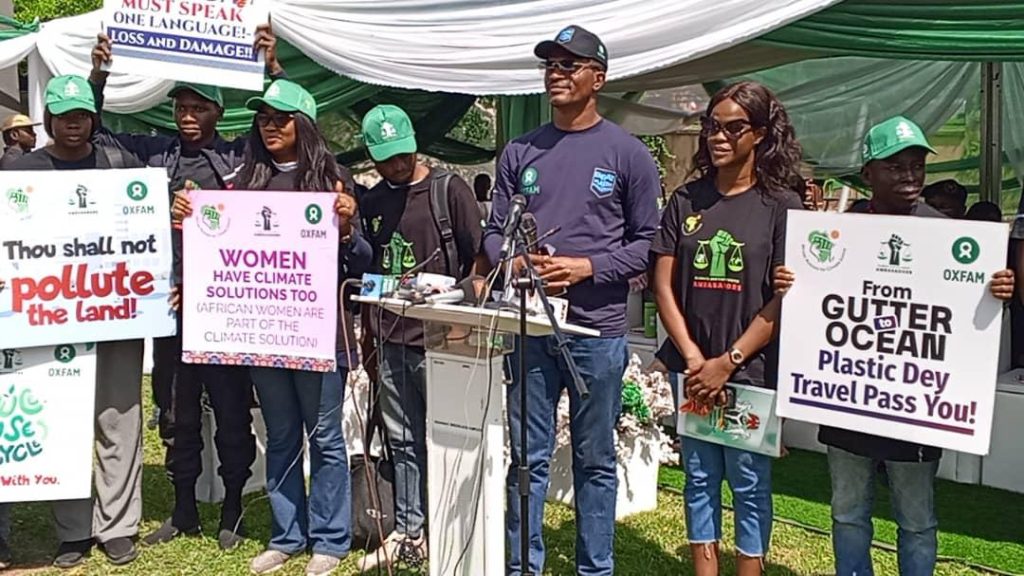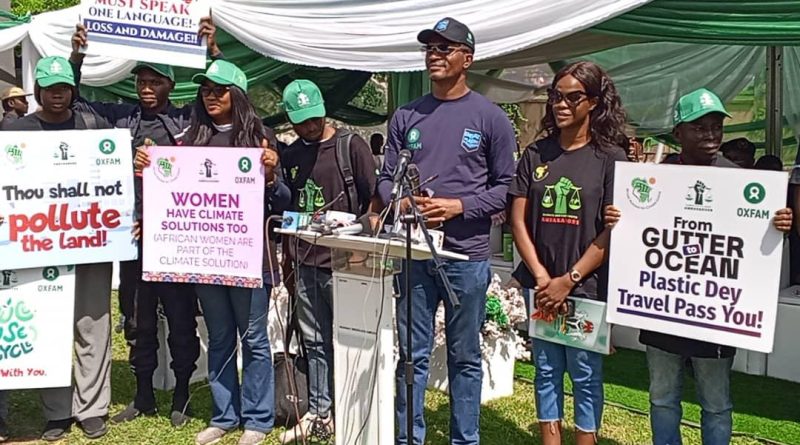ECOWAS Calls For Investment In Plastic Eco-Innovation …Reaffirms Commitment To Clean Environment
By Bukar BOLORI
The Economic Community of West African States (ECOWAS) has called upon all stakeholders in the region to Invest in eco-innovation and plastic alternatives as part of the efforts to address plastic pollution in the region.
The West African sub-region is said to generate nearly eight (8) million metric tonnes (MT) of plastic waste every year, a figure that is set to rise by 52% in the next five years.
More than 80 per cent of plastic waste is reported to be poorly managed in West Africa, adversely affecting human health, ecosystems and blue-economy sectors such as fishing and tourism.

ECOWAS made the call in Abuja on Tuesday at an occasion commemorating the World Environment Day, with the theme: “Together, We Can Beat Plastic Pollution”.
The Commission expressed worries that plastic pollution has become a transboundary problem that requires a coordinated regional response.
The Commissioner, Economic Affairs & Agriculture, Massandje Toure-Litse, speaking on the need to tackle plastic pollution, said, is a test of the region’s resolve to act together, as governments, private sector actors, civil society, and citizens.
Toure-Litse, who was represented by the Acting Director, Environment and Natural Resources, Mr. Yao Bernard Koffi, therefore reaffirmed the commission’s commitment to a clean environment.
The ECOWAS commissioner said: “There is growing recognition that plastic pollution is a transboundary problem that requires a coordinated regional response.
“Tackling plastic pollution is a test of our resolve to act together — as governments, private sector actors, civil society, and citizens.
“ It is fitting that in this landmark year, we reaffirm our commitment to a clean, resilient, and sustainable environment for future generations.
“The theme for this year, “Together, We Can Beat Plastic Pollution”, resonates deeply with our regional priorities. Plastic pollution is not only a global menace but a regional and national crisis.
“There is growing recognition that plastic pollution is a transboundary problem that requires a coordinated regional response. ECOWAS has therefore committed to addressing persistent challenges by adopting Regulation C/REG.17/12/23 on plastics management in 2023, requiring member states to harmonize regulations on plastic products and adopt best practices in plastic waste management.
“Let us be reminded that this challenge is not insurmountable.”
The Commissioner also noted that it is not all gloomy as Ghana and Nigeria are witnessing innovative approaches, scaling up circular economy initiatives.
She also revealed that Senegal and Côte d’Ivoire have introduced plastic bag bans and extended producer responsibility frameworks, while noting that the ECOWAS Commission is supporting Member States to harmonize environmental standards and promote green industrialization.
The Commissioner added that: “But we must do more collectively and urgently. The ECOWAS Vision 2050 identifies environmental sustainability as a pillar of inclusive development. Tackling plastic pollution is a test of our resolve to act together — as governments, private sector actors, civil society, and citizens.
“To this end, a draft regional plastics management plan has been developed with support from the World Bank.
“We call upon all stakeholders in the region to: Invest in eco-innovation and plastic alternatives; Support community-led waste management solutions; Strengthen enforcement of environmental regulations; and Foster youth-driven climate action, because the future belongs to them.”
She further added: “As we celebrate World Environment Day in this Jubilee Year, may our legacy be one of action over words, solutions over excuses, and unity over indifference. The ECOWAS Commission stands ready to work side-by-side with Nigeria and all partners to beat plastic pollution not tomorrow, but today.
“Let us rise to this moment. Let us protect our environment.”
On his part, Nigeria’s Minister of Environment, Balarabe Abbas Lawal, said “Plastic pollution is not just an environmental issue but also an economic and public health crisis.”
He decried that every minute, plastic waste is being dumped into our oceans, rivers, and drainage systems, endangering wildlife and contributing to flooding in our urban centres.
He decried that: “Like many other nations, Nigeria faces significant challenges in managing plastic waste.”
He said the country suffers from burden of unchecked plastic pollution.
Lawal said: “Our cities and rural communities suffer from the burden of unchecked plastic pollution ranging from sachet water bags littering our streets to microplastics entering our food chain and causing public health concerns.”
He, therefore, assured ECOWAS of the Federal Government of Nigeria’s commitment to a cleaner, greener, and more resilient environment.
“I would like to assure you that the Federal Government of Nigeria, under the leadership of President Bola Ahmed Tinubu, GCFR, is committed to a cleaner, greener, and more resilient environment. In line with the Renewed Hope Agenda, we are taking decisive steps to address plastic pollution at all levels,” he said.
The Minister also listed efforts made by the Nigeria government to tame plastic pollution to include: developing and implementing a National Policy on Plastic Waste Management, which provides a strategic framework for reducing plastic use, promoting recycling, and encouraging innovation in alternatives to single-use plastics.
He also noted that the ministry is supporting innovative circular economy models to drive recycling and promote plastic alternatives, especially across government ministries, departments, and agencies.
He added that the ministry launched the Extended Producer Responsibility (EPR) Programme, which mandates producers to take responsibility for the entire lifecycle of their plastic products—from production to disposal.
He said that “The Ministry is collaborating with key stakeholders across government, industry, and civil society to ensure that environmental policies translate into meaningful impact.”




